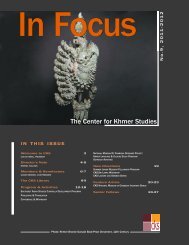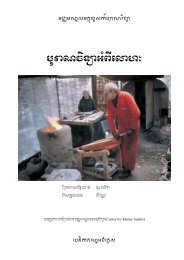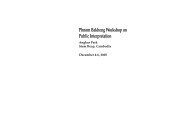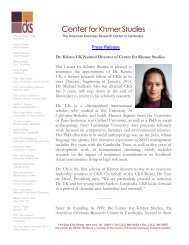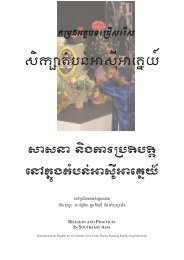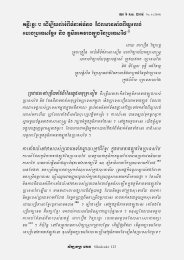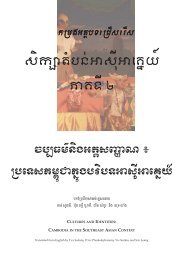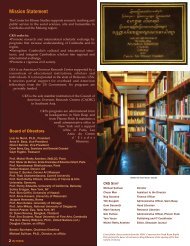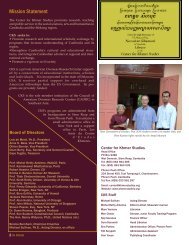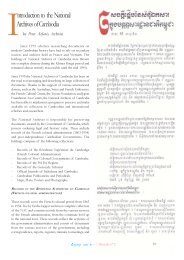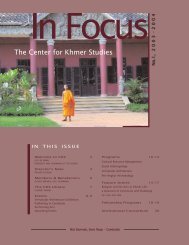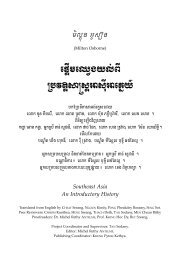You also want an ePaper? Increase the reach of your titles
YUMPU automatically turns print PDFs into web optimized ePapers that Google loves.
Upcoming Events<br />
Voices: Kuong Keany<br />
CKS Junior Fellow, <strong>2012</strong><br />
Here at CKS, we are always looking to develop new ideas <strong>for</strong> events<br />
and activities to help us carry <strong>for</strong>ward our mission. There are a number<br />
of ideas currently in the pipeline <strong>for</strong> lectures and presentations,<br />
training workshops and conferences in both Siem Reap and Phnom Penh.<br />
Heading towards the end of <strong>2012</strong> and into <strong>2013</strong> we look <strong>for</strong>ward to regular<br />
monthly lectures on topics as wideranging as <strong>Khmer</strong> cuisine to cutting edge<br />
archaeological projects in the Kulen hills outside of Siem Reap. CKS research<br />
Fellows will be presenting their research to Cambodian students and faculty<br />
in Phnom Penh and Siem Reap. We are currently in the process of organizing<br />
more visits by students and faculty from Cambodian universities to our<br />
library and research facilities in Siem Reap.<br />
There will also be workshops, small gatherings to explore defined subjects at<br />
depth. At the end of <strong>2012</strong> we will host a training workshop <strong>for</strong> Angkor Wat<br />
temple guides. This is an idea developed by one of the first licensed guides<br />
and longterm colleague of CKS, Mr. Kin Po Thai. Thai feels very strongly<br />
that temple guides need more knowledge and training about conservation<br />
and restoration of the temples than they currently have. The fourday workshop<br />
will provide them with a better understanding of what it means <strong>for</strong><br />
them to be working in a world heritage site.<br />
At the end of <strong>2012</strong>. we plan to hold a conference structured around a book<br />
project that will bring together scholars working from diverse disciplines to<br />
explore ‘Cambodia’s political, ecoenvironmental, and sociocultural developments<br />
over the past quarter century (19902015), in concert with conceptual<br />
frameworks within social science paradigms of social justice, environmental<br />
and comparative political and cultural studies’. The conference will<br />
focus on a number of questions, almost twenty five years after the Paris Peace<br />
Accords initiated the transition from war to peace. What, <strong>for</strong> example, has<br />
changed fundamentally, or been rein<strong>for</strong>ced in the body politic, ecoenvironment,<br />
and sociocultural identities and practices of communities<br />
in Cambodia?<br />
Please check our website <strong>for</strong> details of these and other upcoming<br />
events and activities.<br />
I first heard about CKS through some history<br />
students who were chosen <strong>for</strong> the Junior<br />
Faculty Training Program early in 2008.<br />
Fortunately, after applying <strong>for</strong> the next session,<br />
I was chosen to attend CKS’s Junior<br />
Faculty Training Program in September<br />
that year, on “Contemporary Southeast<br />
Asian History” lectured by Dr. Charnvit<br />
Kasetsiri. It was the first time I had attended a lecture with a <strong>for</strong>eign<br />
professor, which made me feel nervous. However, with the<br />
professional and academic teaching I learned so much from this<br />
program, which not only improved my knowledge of History but<br />
also advanced my English language and research skills.<br />
In 2009, I graduated with a Bachelor Degree of Art in History<br />
from the Royal University of Phnom Penh (RUPP). As I wished to<br />
continue to study a master degree I returned to CKS to attend<br />
the Summer Junior Resident Fellowship Program in 2009 on<br />
“Nation building after <strong>Khmer</strong> Rouge” by Dr. Henry Locard. The<br />
summer program gave me both a chance to further my own<br />
scholarly interest as well as increase my practical experience<br />
and research skills. Also it was great to get to practice my<br />
English with French and American students my own age <strong>for</strong> two<br />
months.<br />
After I came back from Siem Reap, I applied <strong>for</strong> an MA of Social<br />
Work from the Royal University of Phnom Penh. I received a<br />
scholarship to attend this master program in late 2009. On this<br />
international program I found some difficulty with the research<br />
skills and understanding of development. I again attended the<br />
<strong>Center</strong> <strong>for</strong> <strong>Khmer</strong> <strong>Studies</strong>’ Junior Faculty Training Program<br />
“Economics and Development in Southeast Asia”, in April 2010.<br />
I learnt a lot about development theories and poverty reduction<br />
there but most importantly, I had the chance to learn more<br />
about research methodology.<br />
In September 2011 I joined another of CKS’s Junior Faculty<br />
Training Program’s on “Southeast Asian <strong>Studies</strong> and Curricula<br />
Development” during which I gained a much richer knowledge of<br />
Southeast Asian History. Since completing the programs at CKS,<br />
I have become a lecturer at Royal University of Phnom Penh.<br />
IN FOCUS 19



